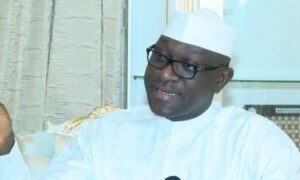
Six months strike: FG, ASUU adamant, disagree on peace proposals
…As ASUU demands separate salary structure
…Tackles FG over ‘no-work-no-pay’ order
…To lose six months salary for strike period as FG insists ‘no pay’
By Moses Adeniyi
Controversies have clustered around the strike of University Unions as the Federal Government and the Academic Staff Union of Universities (ASUU) remained adamant over issues of contention.
Nigerian NewsDirect gathered that while other matters informing the lingering strike might have been resolved with agreement between the Federal Government and the aggrieved Unions, the issue of payment of the six months salaries of members of the Academic Staff Union of Universities (ASUU) withheld by the Federal Government for the striking period is a major contention which as at the time of filing this report was yet to be resolved.
The Federal Government, it was gathered, stood the ground not to shift from its declared ‘no-work-no-pay’ order, stating it would not pay the lecturers for the six month period they have embarked on the strike, as a penalty for their actions.
…ASUU rejects salary structure
Meanwhile, ASUU, in turn on Thursday explained that its meeting with the Prof. Nimi Briggs-led committee last Tuesday, ended in deadlock because the committee presented “award of a Recommended Consolidated University Academic Salary Structure (CONUASS), prepared by the National Salaries, Incomes and Wages Commission” which was unsatisfactory to it.
ASUU in a press statement, made available to journalists on Thursday, by its President, Prof. Emmanuel Osodeke, argued the ‘award salary’ was “against the principle of collective bargaining, based on the Wages Boards and Industrial Council’s Decree No 1 of 1973, the Trade Dispute Act (1976), ILO Conventions 49 (1948), 91(1950), 154 (1988) and recommendation 153 (1981), Udoji Commission Report of 1974, and Cookey Commission Report of 1981.”
The report, ASUU noted, “also provided a platform for resolving such important issues as special salaries and conditions of service of university staff, university funding, roles of Pro-Chancellors, Vice-Chancellors, and National Universities Commission (NUC).
“A key outcome was a special salary scale for university staff known as University Salary Structure (USS).”
ASUU alleged that the Federal Government was insincere in its approach to resolving the lingering crisis in the university academic system, demanding that “The Federal Government, through the Ministry of Education, return to the New Draft Agreement of the 2009 FGN/ASUU Renegotiation Committee, whose work spanned a total of five and half years as a demonstration of good faith.”
The union further argued that the “award” presented by the Nimi Briggs-led Team appeared in a manner of “take-it-or-leave-it on a sheet of paper,” noting that “no serious country in the world treats their scholars this way.”
In the statement, tagged “Why ASUU Rejects Governments Award of Salary,” the union claimed that “Government imposed the ongoing strike action on ASUU and it has encouraged it to linger because of its provocative indifference.”
“The Munzali Jibril-led renegotiation committee submitted the first Draft Agreement in May 2021 but government’s official response did not come until about one year later!
“Again, the ‘Award’ presented by the Nimi Briggs-led Team came across in a manner of take-it-or-leave-it on a sheet of paper. No serious country in the world treat their scholars this way.
“Over the years, particularly since 1992, the Union has always argued for and negotiated a separate salary structure for academics for obvious reasons.
“ASUU does not accept any awarded salary as was the case in the administration of General Abdulsalam Abubakar.
“The separate salary structures in all FGN/ASUU Agreements were usually the outcome of collective bargaining processes. ‘Leaking economy.’
“The major reason given by the Federal Government for the miserly offer, paucity of revenue, is not tenable.
“This is because of several reasons chief of which is poor management of the economy. This has given rise to leakages in the revenue of governments at all levels.
“There is wasteful spending, misappropriation of fund and outright stealing of our collective patrimony.
“ASUU believes that if the leakages in the management of the country’s resources are stopped, there will be more than enough to meet the nation’s revenue and expenditure targets without borrowing and plunging the country into a debt crisis as is the case now,” it argued.
ASUU noted that “at the commencement of the renegotiation of the 2009 FGN/ASUU Agreement on 16th March 2017, both the Federal Government and ASUU Teams agreed to be guided by” some terms of reference, but the Federal Government reneged on its side to abide by the agreement.
It warned that, “Government’s surreptitious move to set aside the principle of collective bargaining, which is globally in practice, has the potential of damaging lecturers’ psyche and destroying commitment to the university system.
“This is, no doubt, injurious to Nigeria’s aspiration to become an active player in the global knowledge industry,” ASUU argued.
…FG insists “no-work-no-pay”
Meanwhile, the Federal Government on Thursday insisted that it will not yield to the demand by ASUU for their members to be paid the six months salaries withheld over the ongoing strike, saying it is meant to be the penalty for their action.
The Minister of Education, Adamu Adamu, at the 47th session of the State House Ministerial Media Briefing organised by the Presidential Communications Team at the Aso Rock Villa, Abuja, said not paying the backlog will serve as deterrence for others who may contemplate strike in future.
He said that other three university based unions that are on strike have accepted to call off the strike in the next one week, except ASUU that has remained adamant insisting that its members should be paid the five months that their salary was stopped.
According to him, ASUU had begun consultations with their members to determine whether to call off their strike as well.
“All contentious issues between the government and ASUU had been settled except the quest for members’ salaries for the period of strike to be paid, a demand that Buhari has flatly rejected,” Adamu mentioned.
Adamu argued that ASUU went on strike despite the huge investment of trillions of naira that President Buhari regime and agencies such as TETFUND and UBEC in education, hence would have to bear the consequences, mentioning that the demand for payment for the strike period was not tenable as President Muhammadu Buhari has flatly rejected same.
According to him, the insistence by ASUU on being paid six months salaries for the strike period is the only issue of contest stalling the negotiations between the Federal Government and the union.
“If you think it is for the government other than what the government is doing in the university to stop strike, the standard government has taken now is not to pay the months in which no work was done.
“I think this is the only thing that is in the hands of government to ensure that there is penalty for some behaviour like this.
“So, I believe teachers will think twice before they join strike if they know that at the end they are not going to be paid and the federal government is not acting arbitrarily.
“Before, it was some magnanimity on its part, there is a law which says if there is no work, there will be no pay.
“I believe this will be a very strong element that will be determining from going on strike,” the Minister said.
Adamu also stated that all other unions including the Senior Staff Association of Nigerian Universities, (SANNU), Non-Academic Staff Union of Education and Associated Institutions, (NASU) and the National Association of Academic Technologists (NAAT) will resume work in the next one week.
The Minister further dismissed media report that President Muhammadu Buhari gave him two-week ultimatum to resolve the misunderstanding between ASUU and the Federal Government.
Adamu informed that the University Peculiar Personnel and Payroll System, U3PS, and the University Transparency Accountability Solution (UTAS) outscored the Integrated Personnel Payroll and Information System (IPPIS) during the integrity tests conducted by NITDA, affirming that ASUU’s peculiarities will be accommodated in whatever platform that may me adopted.
He further said that currently, the IPPIS has been made to accommodate the issue of sabbatical for lecturers, while debunking the report that UTAS had not been approved by government as the payment platform for University teachers.
He said that the government has proposed a new salary to the unions which he said SSANU, NASU, and NAAT have accepted in principle.
He, however, commended the Academic Staff Union of Polytechnics for calling off its own strike.
…We have spent over N6trn on education in seven years – FG
Adamu further claimed that the Federal Government had spent over N6 trillion on revamping the country’s education sector in the last seven years.
According to him, the money was spent on the provision of infrastructure and Information Communication Technology equipment to public institutions of learning across the country.
“The implementation of the sector’s blueprint is on course. In the last seven years, we have undertaken massive physical development of infrastructure, ICT development at all levels of our educational system, established new institutions, improved the carrying capacity of our institutions and expanded access to quality education at all levels.
“Steps are also being taken to accelerate the implementation of the 2020 presidential approval for the revitalisation of the teaching profession.
“The government of President Buhari has expended a total of N6,300,947,848,237 on capital and recurrent expenditure in the education sector in the last seven years,” he said.
The minister pledged that the government would continue to improve on the implementation of its strategic plans as well as create the necessary environment for the overall development of the education sector in Nigeria. Adamu argued that each state of the federation could now boast of at least a federal university and polytechnic.
“This administration has ensured that all states of the federation now have a federal university and a federal polytechnic, with nine universities, nine polytechnics and six colleges of education established between 2018 and today.
“This administration is determined to ensure that they take off very well that is why provisions have been made for all of them,” he said.
Adamu highlighted that the basic and secondary level of education had also received attention in the current administration, with about N553 billion spent in the process.
“…take ASUU to court” for damages — FG tells students
Adamu argued it was duty bound on ASUU to compensate the affected students for the time wasted for the over six-month ASUU strike.
According to him, the Federal Government bears no liability to compensate the students for loss of time for the over six months period which the strike has lasted, stating that if the students are determined to get compensated, they should “take ASUU to court,” for damages incurred over the strike period.
Recall that ASUU had since February 14, 2022 embarked on an indefinite strike over unresolved differences with the government. The union had accused the government of failing to honour and implement the Memorandum of Understanding and Memorandum of Action signed between both parties in 2020 — an agreement that was reached to end a nine-month old strike by ASUU in 2020.
Other issues of contention include the government’s poor commitment to the payment of academic earned allowances and the continued use of the Integrated Personnel Payroll Information System (IPPIS). Also, include the grievances of the academic stakeholders over the refusal of the government to adopt the Universities Transparency and Accountability Solution, as its recommended substitution for IPPIS, and the proliferation of universities in the country. Grievances by other stakeholders in the nation’s public university system had seen more unions including NAAT, SSANU and NASU, subsequently joining up in the strike.



